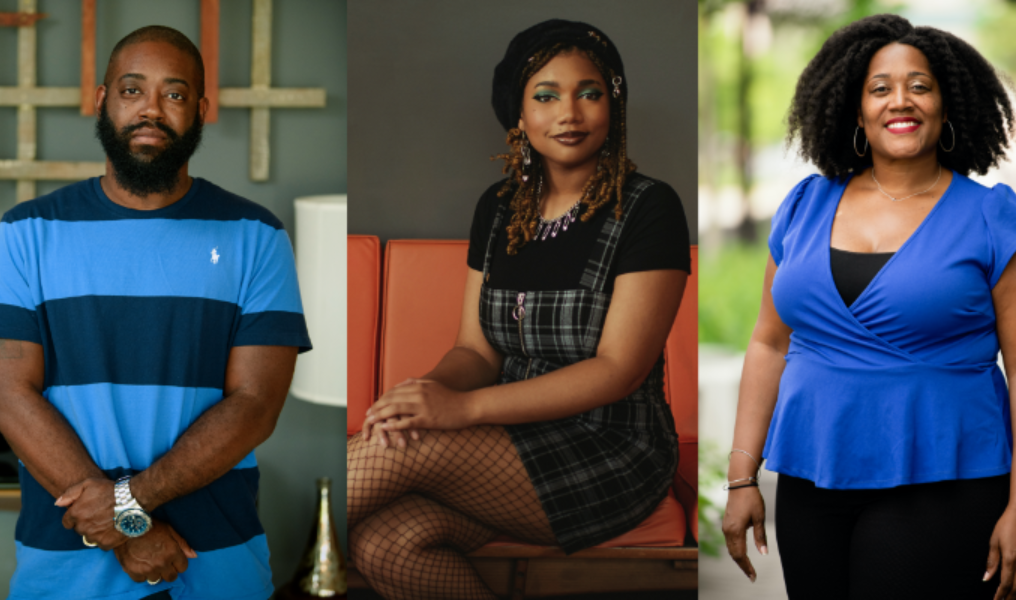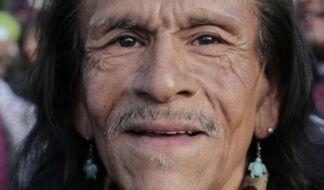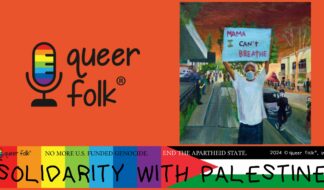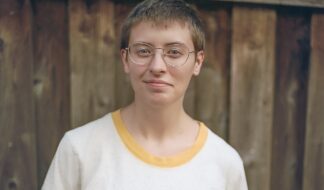The past 18 or so months have seen major disruption in our daily lives including the cancelation or virtualization of community events celebrating Pride. Detroit's Hotter Than July (HTJ), the country's longest running Black LGBTQ+ Pride celebration, is no exception. The majority of the event will be virtual, but not to worry. It'll still be hot.
According to a statement from LGBT Detroit, "The structure of the event itself is a model of care and concern in the wake of COVID-19 by offering hybrid digital and in-person activities that condense the usual events and decrease the risks of COVID-19 exposure to the Black LGBTQ+ community and the public while maintaining HTJ's historic liberatory spirit. While the approach may be different, the rationales and strategies are not necessarily new."
Indeed, public health has always had a role to play at HTJ, which has a history of partnering with health organizations to provide resources and testing to attendees. This year the event is offering COVID-19 vaccines. Also not new is the fact that making HTJ happen requires hard work from many people behind the scenes.

Kyra Sanders
Kyra Sanders is a proud Detroiter and proud ally of the LGBTQ community. A community planner for the Michigan Department of Health and Human Services, she brings public health expertise to her role on the HTJ planning committee.
In fact, it was her idea to provide COVID-19 testing as part of HTJ, the first Pride event to do so. Sanders used the connections she's made over her years working in public health to help make the COVID-19 testing a reality.
"I made the recommendation during one of the [planning] meetings," she tells BTL. She told the HTJ committee, "I can connect you with individuals who are able to provide those services."
The result is three in-person testing and vaccination zones where people can get tested for HIV and vaccinated against COVID-19. Testing and vaccinations will be available Friday, July 23 and Saturday July 25 from 12-5 p.m. at both Palmer Park and Backstreet at Large from 8-10 p.m. Friday through Sunday.
"I am a native Detroiter and I'm a person who believes in science," she says. "I'm familiar with the way [COVID-19] ravaged my community at the height of the pandemic." She adds that people need access so that they have the opportunity to get vaccinated.
"I'm a person who believes in the possibility of people and prevention," Sanders says. "That's why I've found my home in public health."
For people unsure about getting the vaccine, Sanders says, "They need to look within themselves" and "talk to their medical provider or talk to someone who is trusted and aware of the science and just make the best decision for themselves."
She adds that the HTJ vaccination and testing zones are "your opportunity to get [information] firsthand from a medical professional."
In addition to free COVID-19 vaccinations, there will also be free rapid HIV testing.
"It's a simple finger prick and the test itself is run on site," Sanders says, with results available within 20 minutes. Sanders stressed that people will be supported through the process, regardless of the results.
Each agency providing HIV testing can link people to care service and support services, says Sanders, "Whether it's food assistance, identifying safe and secure housing, or speaking with another person living with HIV."
She encourages people curious about their HIV status, people who test regularly but have been interrupted due to COVID-19, people who have already tested positive but have fallen out of care, and people who have questions to "go check it out."
Sanders, who has been doing work surrounding HIV in some capacity for 21 years, understands the fear and stigma that still surrounds HIV testing.
"The stigma is literally killing Black and brown people," she says.
The Black LGBTQ+ community already faces a number of structural barriers, Sanders says. "And then you pile on the fact that you are a person, and you want to live happy and open in a world that is not always welcoming."
In addition to creating safe spaces for the community, Sanders says we also need to create brave spaces where "people are allowed to be brave and supported."
She hopes people will take advantage of HTJ's health zones to get vaccinated and know their status.
"Having access to services eliminates a barrier," which increases a person's likelihood to engage those services, she says. "That's the purpose, in my opinion, of public health. We find a gap and we work and stand in the gap."
"I believe the community has the ability to save itself and to support itself," she says. "It's a pleasure and an honor to do this work."

Lillith Jackson
Lillith Jackson was born in Detroit but currently lives in Ann Arbor where they attend the University of Michigan. Jackson, who identifies as non-binary and bisexual, is a junior majoring in Japanese international studies with a possible German minor. "I learn languages for fun," they say. "I'm planning for study abroad after COVID dies down."
It was through U-M that they got connected with LGBT Detroit where they serve as an intern.
"I was assigned to LGBT Detroit after applying to the Detroit Community Engaged Research Program (DCERP)," Jackson says, explaining that there are organizations that work with U-M to connect with students as a way to become more engaged with the community.
LGBT Detroit is one of these organizations. "I actually didn't know it existed until I started volunteering because I was isolated from anything queer or LGBT until I went to college." Jackson says. "This is my first internship ever."
Jackson chose to work with LGBT Detroit "because I am also queer and I grew up in Detroit, but I did not know that we had a Black-founded queer organization, so I thought I would get to know this part of Detroit better that I was basically closed off to when I was younger."
Their role in HTJ is volunteer management for the testing and vaccination zones. "I'm the main point of contact for volunteers and our testing partners," they say.
HTJ is important, Jackson says, because it is "meant to engage Black queer community" which is "often neglected and marginalized." They add that HTJ "is a place for people to go who are typically not welcome in a lot of spaces."
Jackson adds that HTJ brings "the Black queer community together for this weekend event so that people have a place to have fun and live their best lives."
And, of course, part of living your best life is taking care of your health, which is why the testing and vaccination zones are such a crucial part of HTJ. "Testing is really important in the LGBT community," Jackson says.
Jackson is glad to be a part of HTJ. "It means LGBT community," they say. "It means that I am getting in touch with and having a very intimate connection to the Black queer community and it's a bridge for me to (be a) part of myself that I was disconnected from because my family never allowed me to go to Pride or Pride events."
Jackson's family was not accepting growing up. "My mom wasn't homophobic, but the rest of my family is extremely homophobic," they say. "They don't like gay people, queer people, doesn't matter."
This caused a rift between Jackson and their family. "Out of fear of my family judging me I had to kind of self segregate."
Jackson, who is 20, and is only really out to their mom and dad, says, "I got away from my family so I wasn't contactually having to feel like I'm going to upset this person or this person. Once I became an adult I didn't have to really answer to anyone."
Jackson says being at U-M is a welcome change. "We have a great LGBT group known as the Spectrum Center and in most if not all spaces I have never had someone be outwardly homophobic," Jackson says. "Everyone is accepting, everyone is kind, everyone respects your pronouns, respects your gender. It's one of the most accepting communities I've been in in my whole life."
Celebrating Pride is important to Jackson. "It means freedom to be who I am without judgment, without fear, without the anxiety that I'm going to be rejected, hated, or hurt. Pride is freedom."

Mykell Price
For the past three years, Mykell Price has been part of the planning committee for HTJ and has been involved with LGBT Detroit since 2009. His role in HTJ this year is as a volunteer coordinator, organizing and managing the many volunteers who make HTJ a reality each year.
Managing volunteers for a primarily virtual event is a change from past years, Price says, adding that the need for volunteers "has become more diverse" now that two of the biggest jobs, setting up and breaking down the event, are not a focus. But Price is confident that during the event they will have the people in place to "make sure the flow of the virtual event is happening" and that the testing and vaccination locations are up and running.
Originally from Detroit, Price currently lives in Ypsilanti. He began attending HTJ in 2002 "right after I graduated high school."
"A lot of members of my family and also people in my social network were actually attending this huge event and I didn't understand what it was until I went," he tells BTL. "They kept talking about this annual event in the summer time at Palmer Park."
His reaction to his first HTJ: "Wow, this is great."
And so Price became a regular attendee, starting as a vendor selling his artwork and handcrafted jewelry.
"I grew up in the LGBT community in Detroit, so I know a lot of folks in this community and I identify as a member of the LGBT community as well," he says.
As he grew up he started to "really understand my own social identity," he says. "Once I started to identify as LGBTQ myself, all of the events I've primarily attended have been in LGBT affirming spaces."
Price's family has always been inclusive and welcoming. "One member of my family came out as a trans woman when I was 6 years old and that was my first introduction to any LGBTQ identities," Price says. "My family really embraced and supported her female identity and I think it was really helpful for me to see so much affirmation poured into her."
Unfortunately, additional exposure was limited. "From there, the only other awareness and knowledge I had around LGBT identities was watching television," Price says.
Price watched shows like "Jerry Springer" and others that included LGBTQ+ identities, "but through a negative lens," he says. "Those shows stigmatized LGBT identities."
Still, he found them intriguing because he saw some of his own experiences. "But the violence and the bullying and the stigmatizing statements that were made about the LGBT community kept me afraid to identify my own identity," he says.
Thankfully, as Price transitioned into adulthood he wasn't limited to learning about LGBTQ+ people and culture from daytime TV and soon realized "how prevalent LGBTQ identities are."
His mother, for example, had "a lot of lesbian friends," he says. "I saw my mother, who is really close to me, embracing and supporting the lesbian community and I thought it was awesome to see that my mother was a strong ally. So once I started to disclose things about my own identify to my family, I was very much so accepted and supported and was encouraged to pursue my own happiness and my true identity. All of my friends, all of my family members have been very accepting."
Which is how he finds himself a staple at HTJ.
"It's important to have a Black Pride event because Black culture is very unique," Price says.
"I don't know if the white LGBTQ community realizes how they show up or don't show up for the Black LGBTQ folks." At many Pride events, he says, "Things seem to be very centered around white culture," with people who express a desire for "more diverse options" being "met with resistance or just not being responded to."
He says, "We just have to ether assimilate to the things that are given to us and appreciate those things or to just create our own spaces."
There is something special about those spaces.
"At the intersection of blackness and queerness is an opportunity for folks to really experience those unique experiences together," he says. "To be around people who can relate to you as a Black and a queer person is very important to help support people's health and wellness."
After all, not every place is welcoming, with many being anti-Black or anti-LGBTQ+ or anti-both, he says. HTJ celebrates all that a person is, which is necessary "if we want to see people thrive and want them to feel like they really are part of a broader community."
In this way, HTJ is a refuge. "To bridge all of these pieces together there need to be spaces where people can recover from the anti-blackness and the anti-LGBTQ stigmatization," he says. "That is a very difficult life to live."
Price values being "in a space where I don't have to worry about my hair making people uncomfortable," or his skin or his hip hop culture.
"If it wasn't for Hotter Than July, I personally don't believe I would be living my truth," he says. "I have not experienced any other event like Detroit's Hotter Than July because being a native Detroiter I have my own ways of connecting to Detroit culture and my ways to connect to Black culture and LGBTQ culture, and so to be in one space that honors multiple parts of my own identities, I don't think it could be matched."
As part of Hotter Than July's commitment to increase access to health resources for Black LGBTQ+ people, this year will offer in-person testing and vaccination zones where people can get tested for HIV and vaccinated against COVID-19. Partners include Community Health Awareness Group, Unified HIV Health and Beyond, Wayne Health, and the Detroit Recovery Project. Testing and vaccinations will be available Friday, July 23 and Saturday July 25 from 12-5 p.m. at both Palmer Park and Backstreet at Large (14925 Livernois Ave.) from 8-10 p.m. Friday through Sunday. Find a full schedule of events here.










